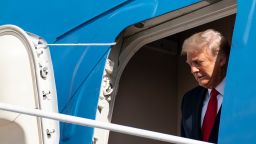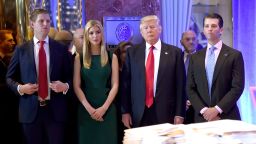Civil lawsuits seeking to hold Donald Trump accountable for the January 6 insurrection can move forward in court, and the ex-President doesn’t have absolute immunity from litigation, a federal judge ruled Friday.
Trump’s statements to his supporters before the attack on the US Capitol “is the essence of civil conspiracy,” Judge Amit Mehta wrote in a 112-page opinion, because Trump spoke about himself and rally-goers working “towards a common goal” of fighting and walking down Pennsylvania Avenue.
“The President’s January 6 Rally Speech can reasonably be viewed as a call for collective action,” Mehta said.
RELATED: Trump’s legal woes deepen and could bring new political trouble
Democratic members of the House and police officers who defended the US Capitol on January 6 sued Trump, claiming he prompted his supporters to attack. Friday, Mehta wrote that the lawsuits could move to the evidence-gathering phase and toward a trial – a major loss in court for Trump.
“To deny a President immunity from civil damages is no small step. The court well understands the gravity of its decision. But the alleged facts of this case are without precedent,” Mehta wrote.
“After all, the President’s actions here do not relate to his duties of faithfully executing the laws, conducting foreign affairs, commanding the armed forces, or managing the Executive Branch,” Mehta added. “They entirely concern his efforts to remain in office for a second term. These are unofficial acts, so the separation-of-powers concerns that justify the President’s broad immunity are not present here.”
The decision was issued in a trio of lawsuits filed after the January 6 Capitol breach seeking to hold the former President and his allies accountable for the riot.
When the Senate failed to convict Trump last year in the impeachment proceedings examining his role in the attack, Minority Leader Mitch McConnell – who voted against convicting Trump – noted that “civil litigation” was avenue through which Trump’s conduct could be addressed.
Two of the lawsuits were brought by Democratic House members, while a third was filed by Capitol Police officers.
The lawmakers allege that they were threatened by Trump and others as part of a conspiracy to stop the congressional session that would certify the 2020 presidential election on January 6, 2021, according to the complaints. They argue that Trump should bear responsibility for directing the assaults.
Trump’s legal team is likely to appeal the decision, which was made at the trial-level DC District Court. Representatives for Trump didn’t immediately respond to requests for comment.
Mehta ruling on what he calls a “one-of-a-kind case” sets up a rare instance where the former President could face concrete consequences for the insurrection.
But Mehta’s opinion, essentially melting away the protections of the presidency and the First Amendment because of the context of Trump’s speech and specific words and actions that day, could have further implications in court.
At this time, there are no public indications that the Justice Department’s criminal investigation into January 6, which includes several sets of conspiracy charges and a sedition case, has reached Trump. And after Republican lawmakers blocked Trump’s impeachment conviction, the GOP has largely fallen back in line behind the former President. The two House Republicans now serving on the committee to investigate the insurrection have faced calls for their ouster from the party, and Trump may very well be Republicans’ 2024 nominee for the White House.
The decision, Friday, however, sets in motion a path to civil trials months or years from now, where Trump is at the defense table.
Role of Proud Boys and Oath Keepers
Mehta wrote that it’s plausible the lawsuit could prove Trump entered into an agreement with far-right groups the Proud Boys and the Oath Keepers, who are criminally charged for conspiracy and also named in the lawsuit.
The judge noted how Trump told the Proud Boys to “stand back and stand by” at a debate before the election, and that he likely was aware of the Oath Keepers attending his rallies and of violence planned because of his election loss.
“It is reasonable to infer that the President knew that these were militia groups and that they were prepared to partake in violence for him,” the judge said. “The President thus plausibly would have known that a call for violence would be carried out by militia groups and other supporters.”
The cases will proceed against the Oath Keepers organization and against Enrique Tarrio, the recently incarcerated leader of the Proud Boys. They sought to get the case dismissed but the judge concluded that the allegations – of a conspiracy between Trump and the extremist groups and leaders – were plausible enough to allow the litigation to move forward.
Partial victory for other Trump allies
Some of his allies who were named as co-defendants succeeded in getting the civil suits against them dismissed.
This includes his eldest son, Donald Trump Jr., and his former attorney Rudy Giuliani, who were named as defendants in some of the cases, but successfully argued that the lawsuits should be thrown out.
The judge indicated he would also eventually dismiss the case against Rep. Mo Brooks, an Alabama Republican, but he wasn’t ready to do that on Friday due to technical reasons related to Brooks’ defense strategy.
They have all denied wrongdoing related to January 6.
Judge: Giuliani conspired to peddle disinformation
Regarding Giuliani, the judge said “there is little doubt” that he “was involved in a conspiracy” to peddle disinformation about the 2020 election – but that doesn’t violate the laws at issue in this lawsuit.
Democrats and police officers who filed the lawsuits “fall short” of establishing that Giuliani directly conspired to stop Congress from certifying the election on January 6 by force or intimidation, Mehta ruled.
Even though Giuliani spoke at the “Save America” rally before the riot, and told the crowd, “let’s have trial by combat,” the judge ruled that those comments weren’t strong enough to establish a conspiracy.
“Critically, Giuliani uttered no words that resembled a call to action. ‘Trial by combat’ was not accompanied by a direction to do anything,” Mehta wrote, calling it “constitutionally protected speech,” and pointing out that Giuliani didn’t know Trump would direct his supporters to march on the Capitol.
The judge said the allegations against Trump Jr. were even weaker, and thus should be dismissed.
“The allegations against Trump Jr. are insufficient to make him a co-conspirator in a plan to disrupt Congress from performing its duties,” Mehta wrote.
That situation was much different than Trump’s – who not only spoke about the crowd marching to the Capitol and fighting, but also failed to tell his rioting supporters to stand down as the violence unfolded. Instead, Trump criticized then-Vice President Mike Pence, presiding over the electoral college certification, on Twitter, 12 minutes into the attack.
“When the President said to the crowd at the end of his remarks, ‘We fight. We fight like hell and if you don’t fight like hell, you’re not going to have a country anymore,’ moments before instructing them to march to the Capitol, the President’s speech plausibly crossed the line into unprotected territory,” Mehta wrote.
This story has been updated with additional details.






Comments